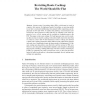Free Online Productivity Tools
i2Speak
i2Symbol
i2OCR
iTex2Img
iWeb2Print
iWeb2Shot
i2Type
iPdf2Split
iPdf2Merge
i2Bopomofo
i2Arabic
i2Style
i2Image
i2PDF
iLatex2Rtf
Sci2ools
126
click to vote
PAM
2009
Springer
2009
Springer
Revisiting Route Caching: The World Should Be Flat
Internet routers’ forwarding tables (FIBs), which must be stored in expensive fast memory for high-speed packet forwarding, are growing quickly in size due to increased multihoming, finer-grained traffic engineering, and deployment of IPv6 and VPNs. To address this problem, several Internet architectures have been proposed to reduce FIB size by returning to the earlier approach of route caching: storing only the working set of popular routes in the FIB. This paper revisits route caching. We build upon previous work by studying flat, uni-class (/24) prefix caching, with modern traffic traces from more than 60 routers in a tier-1 ISP. We first characterize routers’ working sets and then evaluate route-caching performance under different cache replacement strategies and cache sizes. Surprisingly, despite the large number of deaggregated /24 subnets, caching uni-class prefixes can effectively curb the increase of FIB sizes. Moreover, uni-class prefixes substantially simplify a ...
| Added | 20 May 2010 |
| Updated | 20 May 2010 |
| Type | Conference |
| Year | 2009 |
| Where | PAM |
| Authors | Changhoon Kim, Matthew Caesar, Alexandre Gerber, Jennifer Rexford |
Comments (0)

